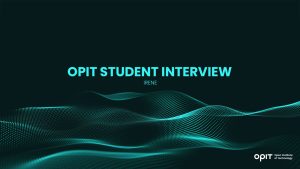Read the full article below (in Italian):
The Magazine
👩💻 Welcome to OPIT’s blog! You will find relevant news on the education and computer science industry.
Search inside The Magazine




Source:
- Il Sole 24 Ore, published on June 23rd, 2025
At its core is a teaching heritage made up of 131 courses, 3,500 hours of video, 1,800 live sessions

Source:
- Agenda Digitale, published on June 16th, 2025
By Lokesh Vij, Professor of Cloud Computing Infrastructure, Cloud Development, Cloud Computing Automation and Ops and Cloud Data Stacks at OPIT – Open Institute of Technology
NIST identifies five key characteristics of cloud computing: on-demand self-service, network access, resource pooling, elasticity, and metered service. These pillars explain the success of the global cloud market of 912 billion in 2025

You’ve probably seen two of the most recent popular social media trends. The first is creating and posting your personalized action figure version of yourself, complete with personalized accessories, from a yoga mat to your favorite musical instrument. There is also the Studio Ghibli trend, which creates an image of you in the style of a character from one of the animation studio’s popular films.
Both of these are possible thanks to OpenAI’s GPT-4o-powered image generator. But what are you risking when you upload a picture to generate this kind of content? More than you might imagine, according to Tom Vazdar, chair of cybersecurity at the Open Institute of Technology (OPIT), in a recent interview with Wired. Let’s take a closer look at the risks and how this issue ties into the issue of responsible artificial intelligence.
Uploading Your Image
To get a personalized image of yourself back from ChatGPT, you need to upload an actual photo, or potentially multiple images, and tell ChatGPT what you want. But in addition to using your image to generate content for you, OpenAI could also be using your willingly submitted image to help train its AI model. Vazdar, who is also CEO and AI & Cybersecurity Strategist at Riskoria and a board member for the Croatian AI Association, says that this kind of content is “a gold mine for training generative models,” but you have limited power over how that image is integrated into their training strategy.
Plus, you are uploading much more than just an image of yourself. Vazdar reminds us that we are handing over “an entire bundle of metadata.” This includes the EXIF data attached to the image, such as exactly when and where the photo was taken. And your photo may have more content in it than you imagine, with the background – including people, landmarks, and objects – also able to be tied to that time and place.
In addition to this, OpenAI also collects data about the device that you are using to engage with the platform, and, according to Vazdar, “There’s also behavioral data, such as what you typed, what kind of image you asked for, how you interacted with the interface and the frequency of those actions.”
After all that, OpenAI knows a lot about you, and soon, so could their AI model, because it is studying you.
How OpenAI Uses Your Data
OpenAI claims that they did not orchestrate these social media trends simply to get training data for their AI, and that’s almost certainly true. But they also aren’t denying that access to that freely uploaded data is a bonus. As Vazdar points out, “This trend, whether by design or a convenient opportunity, is providing the company with massive volumes of fresh, high-quality facial data from diverse age groups, ethnicities, and geographies.”
OpenAI isn’t the only company using your data to train its AI. Meta recently updated its privacy policy to allow the company to use your personal information on Meta-related services, such as Facebook, Instagram, and WhatsApp, to train its AI. While it is possible to opt-out, Meta isn’t advertising that fact or making it easy, which means that most users are sharing their data by default.
You can also control what happens with your data when using ChatGPT. Again, while not well publicized, you can use ChatGPT’s self-service tools to access, export, and delete your personal information, and opt out of having your content used to improve OpenAI’s model. Nevertheless, even if you choose these options, it is still worth it to strip data like location and time from images before uploading them and to consider the privacy of any images, including people and objects in the background, before sharing.
Are Data Protection Laws Keeping Up?
OpenAI and Meta need to provide these kinds of opt-outs due to data protection laws, such as GDPR in the EU and the UK. GDPR gives you the right to access or delete your data, and the use of biometric data requires your explicit consent. However, your photo only becomes biometric data when it is processed using a specific technical measure that allows for the unique identification of an individual.
But just because ChatGPT is not using this technology, doesn’t mean that ChatGPT can’t learn a lot about you from your images.
AI and Ethics Concerns
But you might wonder, “Isn’t it a good thing that AI is being trained using a diverse range of photos?” After all, there have been widespread reports in the past of AI struggling to recognize black faces because they have been trained mostly on white faces. Similarly, there have been reports of bias within AI due to the information it receives. Doesn’t sharing from a wide range of users help combat that? Yes, but there is so much more that could be done with that data without your knowledge or consent.
One of the biggest risks is that the data can be manipulated for marketing purposes, not just to get you to buy products, but also potentially to manipulate behavior. Take, for instance, the Cambridge Analytica scandal, which saw AI used to manipulate voters and the proliferation of deepfakes sharing false news.
Vazdar believes that AI should be used to promote human freedom and autonomy, not threaten it. It should be something that benefits humanity in the broadest possible sense, and not just those with the power to develop and profit from AI.
Responsible Artificial Intelligence
OPIT’s Master’s in Responsible AI combines technical expertise with a focus on the ethical implications of AI, diving into questions such as this one. Focusing on real-world applications, the course considers sustainable AI, environmental impact, ethical considerations, and social responsibility.
Completed over three or four 13-week terms, it starts with a foundation in technical artificial intelligence and then moves on to advanced AI applications. Students finish with a Capstone project, which sees them apply what they have learned to real-world problems.

In May 2025, Riccardo Ocleppo, founder of the Open Institute of Technology (OPIT), gave the audience at TEDx Parma in Italy an insight into why he created OPIT, a new type of university that is quickly becoming essential in preparing students for an increasingly technological future.
Meet Riccardo
Although Riccardo graduated from Politecnico di Torino with a bachelor’s in electronic engineering in 2006 – followed by a master’s degree in 2008 – he felt unprepared for the challenges he felt he had to face as a professional. He sought to expand his vision by completing the master’s program at the London School of Business.
While studying in London, Riccardo became focused on how he could help other students optimize their studies and ensure they were properly prepared for their futures. This resulted in the creation of Docsity, an international online community where university students could exchange study materials to prepare for exams.
Docsity has grown into a global community with 15 million registered students. Moreover, it partners with over 250 universities and business schools worldwide that interview students and provide that information to educational organizations to help them refine their offerings. This experience of working as a conduit between students and universities shaped Riccardo’s understanding of the higher education sector’s needs, eventually leading to the creation of OPIT.
The Challenges Facing Higher Education
In his TEDx talk, Riccardo asked the Parma audience to imagine themselves on their first day of university – sitting in their classroom as their professor explains the concepts that they will learn over the coming years, designed to prepare them for the future.
But, he asked, how long will the skills in your curriculum be relevant? In the past, the skills learned at university would last someone for the rest of their professional lives. But today, with technology changing faster than ever, we have reached the point where we can’t accurately predict what technologies we will be using in five years. It is even more challenging, he said, to predict what kind of knowledge children sitting in classrooms today will need when they reach adulthood.
The inability to predict the skills that students will need in the future or adapt courses quickly enough to include those skills is why many university degrees are no longer fit for purpose, Riccardo explained. Instead, he stated, they are preparing students for a destination that will no longer exist when they graduate while pushing them over a road with a constantly moving target destination.
Building OPIT
With these challenges and his experiences from Docsity in mind, Riccardo set to work designing the kind of education he wished that he had received. He set out to create a university that would allow learners, at any stage in their career, to adapt and reinvent themselves for the changing world. The result was OPIT, which matriculated its first students in 2023.
With that in mind, OPIT courses are built around three pillars.
Pillar One: Bridging Theory and Practice
Universities often produce students with excellent theoretical knowledge of a subject area but with limited ability to apply that knowledge to real-world problems. It is how Riccardo felt about his knowledge and skills when he completed his electronic engineering degree.
OPIT degrees, on the other hand, are designed to provide students with not only a strong technical foundation but also an understanding of and the ability to develop real-world applications.
The OPIT faculty, recruited from some of the world’s leading businesses, play a central role in achieving this. Instead of relying on polished case studies published years after the fact, they use real-life workplace challenges as teaching tools.
Faculty members include practitioners and thought leaders from some of the world’s biggest tech companies, including Zorina Alliata, Principal AI and Generative AI Strategist at Amazon; Khaled Elbehiery, Senior Director and Network Engineer at Charter Communications; Andrea Gozzi, Head of Strategy and Partnership for the Digital Industries Ecosystem at Siemens; and Sabya Dasgupta, Lead Solution Architect at Microsoft.
For MSc programs, students complete this focus on application with the final Capstone Project, which encourages them to apply their knowledge to the real world through an industry internship.
Pillar Two: International and Multidisciplinary
As well as recruiting professors with an international and multidisciplinary profile, OPIT seeks to do the same with the cohort – people working in diverse fields and looking for ways to leverage the same technology to improve what they do. The diversity of the student profile helps break down both educational and industrial silos, encouraging multidisciplinary thinking and unexpected innovation. It can also give students a greater level of cultural awareness, which they may not have encountered before.
Courses involve online meetups between peers, allowing them to share challenges and learn through application. OPIT also hosts online events that allow students to connect with leaders from companies such as Morgan Stanley, PayPal, and Microsoft, to learn about the professional world today and forge networks for the future.
Pillar Three: Education That Fits Your Life
The third pillar of OPIT is that education should be flexible and fit into your life, rather than require you to put the rest of your life on hold to study. This is especially important for established professionals who want to adapt or reinvent themselves but don’t have the luxury of walking away from their work and other responsibilities for a few years to do so.
This is why OPIT courses are online by design – or “remote first,” as many companies brand it. This not only allows students to build study into their existing lives but also to develop experience working remotely as part of a distributed team, which are essential skills in today’s work environment.
OPIT Courses
Today, criteria such as “data literacy” and “comfortable working with AI” are often at the top of job descriptions. With these and other necessary skills in mind, OPIT launched with a BSc in Modern Computer Science and an MSc in Applied Data Science and AI.
Since then, they have also initiated a BSc in Digital Business and MSc degrees in Digital Business and Innovation, Responsible Artificial Intelligence, and Enterprise Cybersecurity. The first cohort of students celebrated their graduation ceremony on March 8, 2025.

During the Open Institute of Technology’s (OPIT) 2025 graduation day, the OPIT team interviewed graduating student Irene about her experience with the MSc in Applied Data Science and AI. The interview focused on how Irene juggled working full-time with her study commitments and the value of the final Capstone project, which is part of all OPIT’s master’s programs.
Irene, a senior developer at ReActive, said she chose to study at OPIT to update her skills for the current and future job market.
OPIT’s MSc in Applied Data Science and AI
In her interview, Irene said she appreciated how OPIT’s course did not focus purely on the hard mathematics behind technologies such as AI and cloud computing, but also on how these technologies can be applied to real business challenges.
She said she appreciated how the course gave her the skills to explain to stakeholders with limited technical knowledge how technology can be leveraged to solve business problems, but it also equipped her to engage with technical teams using their language and jargon. These skills help graduates bridge the gap between management and technology to drive innovation and transformation.
Irene chose to continue working full-time while studying and appreciated how her course advisor helped her plan her study workload around her work commitments “down to the minute” so that she never missed a deadline or was overcome by excessive stress.
She said she would recommend the program to people at any stage in their career who want to adapt to the current job market. She also praised the international nature of the program, in terms of both the faculty and the cohort, as working beyond borders promises to be another major business trend in the coming years.
Capstone Project
Irene described the most fulfilling part of the program as the final Capstone project, which allowed her to apply what she had learned to a real-life challenge.
The Capstone Project and Dissertation, also called the MSc Thesis, is a significant project aimed at consolidating skills acquired during the program through a long-term research project.
Students, with the help of an OPIT supervisor, develop and realize a project proposal as part of the final term of their master’s journey, investigating methodological and practical aspects in program domains. Internships with industrial partners to deliver the project are encouraged and facilitated by OPIT’s staff.
The Capstone project allows students to demonstrate their mastery of their field and the skills they’ve learned when talking to employers as part of the hiring process.
Capstone Project: AI Meets Art
Irene’s Capstone project, “Call Me VasarAI: An AI-Powered Framework for Artwork Recognition and Storytelling,” focused on using AI to bridge the gap between art and artificial intelligence over time, enhancing meaning through contextualization. She developed an AI-powered platform that allows users to upload a work of art and discover the style (e.g. Expressionism), the name of the artist, and a description of the artwork within an art historical context.
Irene commented on how her supervisor helped her fine-tune her ideas into a stronger project and offered continuous guidance throughout the process with weekly progress updates. After defending her thesis in January, she noted how the examiners did not just assess her work but guided her on what could be next.
Other Example Capstone Projects
Irene’s success is just one example of a completed OPIT Capstone project. Below are further examples of both successful projects and projects currently underway.
Elina delivered her Capstone project on predictive modeling of natural disasters using data science and machine learning techniques to analyze global trends in natural disasters and their relationships with climate change-related and socio-economic factors.
According to Elina: “This hands-on experience has reinforced my theoretical and practical abilities in data science and AI. I appreciate the versatility of these skills, which are valuable across many domains. This project has been challenging yet rewarding, showcasing the real-world impact of my academic learning and the interdisciplinary nature of data science and AI.”
For his Capstone project, Musa worked on finding the optimal pipeline to fine-tune a language learning model (LLM) based on the specific language and model, considering EU laws on technological topics such as GDPR, DSA, DME, and the AI Act, which are translated into several languages.
Musa stated: “This Capstone project topic aligns perfectly with my initial interests when applying to OPIT. I am deeply committed to developing a pipeline in the field of EU law, an area that has not been extensively explored yet.”
Tamas worked with industry partner Solergy on his Capstone project, working with generative AI to supercharge lead generation, boost SEO performance, and deliver data-driven marketing insights in the realm of renewable energy.
OPIT’s Master’s Courses
All of OPIT’s master’s courses include a final Capstone project to be completed over one 13-week term in the 90 ECTS program and over two terms in the 120 ECTS program.
The MSc in Digital Business and Innovation is designed for professionals who want to drive digital innovation in both established companies and new digital-native contexts. It covers digital business foundations and the applications of new technologies in business contexts. It emphasizes the use of AI to drive innovation and covers digital entrepreneurship, digital product management, and growth hacking.
The MSc in Responsible Artificial Intelligence combines technical expertise with a focus on the ethical implications of modern AI. It focuses on real-world applications in areas like natural language processing and industry automation, with a focus on sustainable AI systems and environmental impact.
The MSc in Enterprise Cybersecurity prepares students to fulfill the market need for versatile cybersecurity solutions, emphasizing hands-on experience and soft-skills development.
The MSc in Applied Data Science and AI focuses on the intersection between management and technology. It covers the underlying fundamentals, methodologies and tools needed to solve real-life business problems that can be approached using data science and AI.
Have questions?
Visit our FAQ page or get in touch with us!
Write us at +39 335 576 0263
Get in touch at hello@opit.com
Talk to one of our Study Advisors
We are international
We can speak in:
